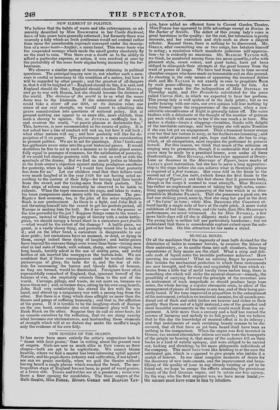••• NEW ELEMENT IN POLITICS.
WE believe that the habits of waste and idle extravagance, so ad- mirably described by Miss EDGWORTH in her Castle Rackrent, have of late years been generally reformed ; but formerly there was scarcely a folly which an Irish gentleman would not commit rather than incur the unendurable reproach conveyed under the descrip- tion of a mane baste—Anglia, a mean beast. This mane baste was the suspended scourge which made the small gentry absolutely fly on the road to ruin. Was there ever a doubt as to the ability to afford a particular expense, or action, it was resolved at once by the probability of the mane baste stigma being incurred by the for- bearance.
We observe a similar system of terrorism obtaining in political questions. The principal inquiry now is, not whether such a mea- sure is useful or necessary to the condition of a nation, but how it will be regarded by other people ; and the greatest of all dangers is, that it will be laughed at England should do this, it is said, and England should do that ; England should chastise Don MIGUEL, and go to war with Russia, lest she should become the derision of the world. The derision of the world is to us what the mane baste was to the Irishman. If the admiration of the world could take a stiver off our debt, or its derision relax one sinew of our real strength, we would assent to admitting this grave consideration into questions of national policy. But at present nothing can appear to us more idle, more childish, than such a slavery to opinion. Go, as JUVENAL scoffingly has it, and overrun the world, " ut pueris placeas et declamatio fias." This, however, is now recommended as the course of policy. It is not asked how a line of conduct will suit us, but how it will look ; what other nations will say ; and how posterity will like the de- sciiption of it on paper. The picturesque is a main consideration in present politics. We are to act for paintings. Alas ! banks and tax-gatherers never enter into the geeat historical pieces. It would doubtless be fine to act in such a manner as to make grand scenes fully equal to passages of romance, for the satisfaction of posterity, if we could but charge posterity with the cost as well as with the spectacle of the drama. But we find as much justice as blunder in the Irish orator's objection against making prodigious sacrifices for posterity, when he added "I would fain know what posterity has done for us." Let our children read that their fathers were very much laughed at in the year 1828 for not having acted ac- cording to the custom of their folly—for having kept their hands from the sword, and the taxing-man from their pockets. The first steps of reform may invariably be observed to be liable to ridicule. When the toper renounces his cups, and takes to water, his boon companions make merry with his abstinence. The pro- fligate's first economy, too, is the joke of his sober neighbours. Such is our predicament. As there is a fight, and John Bull is not thrusting himself into the crowd to get his pockets picked, all Europe is making him the butt. Be it so—are we the poorer or the less powerful for the jest ? Suppose things come to the worst— suppose, instead of filling the page of history with a noble battle- piece, we should occupy a broad sheet in a caricature port-feuille —what would be the extent of the damage ? A battle-piece, we grant, is a vastly showy thing, and posterity would like to look at it ; and on the other hand, a caricature is disagreeable to our dear pride; but caricatures have no maimed, or dead, or dying in them, except indeed those dying of laughter; and battle-pieces have beyond the canvass things even worse than these—taxing-men clad in sad suits of black, with solemn, sharp, sallow visages, lean long hands, terribly adroit in the use of stubby pens, and awful bottles of ink inserted like nosegays in the button-hole. We are confident that if these consequences could be worked into the picturesque of glory, the taste for it, and the fear of ridi- cule for renouncing the barren and bloody fields of honour, as they are termed, would be diminished. Foreigners have often reproachfully remarked of England, that, ignorant herself of the horrors of war, she unpitiably extends them to the rest of the world. Carnage, pillage, and waste, do riot scare us, because we know them not ; and, in former days, sitting by his own snug hearth, John Bull very comfortably has stirred his fire with the one hand, and stirred up a sanguinary war with a money-bag from the other. But there is a thing which does affright us more than the throes and pangs of suffering humanity ; and that is, the affection of the purse. If it is terrible to be the laughing-stock of Europe on the one hand, consider also what detriment glory will be to Bank Stock on the other. Suppose they do call us mane baste, let us console ourselves by the reflection, that we are doing exactly what becomes our circumstances, and husbanding those elements of strength which will at no distant day make the scoffer's laugh only the evidence of his own folly.


















 Previous page
Previous page